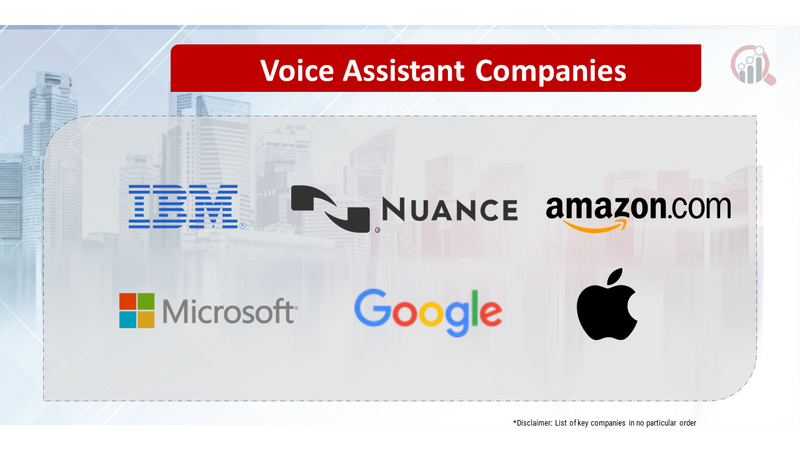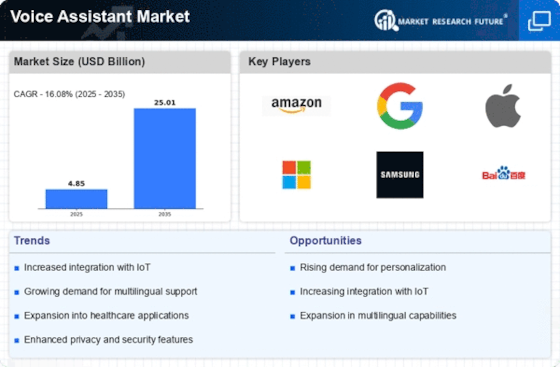Top Industry Leaders in the Voice Assistant Market

Competitive Landscape of Voice Assistant Market
The voice assistant market is experiencing explosive growth, driven by increasing consumer demand for hands-free convenience and the rapid development of artificial intelligence (AI) and natural language processing (NLP) technologies. This dynamic landscape is characterized by established players vying for dominance, new entrants attempting to disrupt the market, and strategic investments shaping the industry's future.
Key Players Dominate the Market:
- IBM Corporation (US)
- Nuance Communications Inc (US)
- com (US)
- Microsoft (US)
- Google LLC (US)
- Apple Inc (US)
The current landscape is dominated by a few key players:
- Google Assistant: Pre-installed on Android devices and embedded in Google Home smart speakers, Google Assistant boasts a large user base and strong integration with Google services like Search and Maps.
- Amazon Alexa: Powered by Amazon's Echo devices, Alexa enjoys a significant presence in the smart home market and offers extensive third-party skills and integrations.
- Apple Siri: Exclusively available on Apple devices, Siri benefits from a loyal user base and tight integration with the Apple ecosystem.
- Microsoft Cortana: Primarily focused on productivity tasks, Cortana integrates with Windows and Microsoft 365 suite, aiming to enhance user workflow.
Strategies for Market Share Gain:
These major players employ various strategies to gain market share:
- Device Ecosystem: Google and Amazon lead the way with their respective smart speaker and smart display lines, providing users with dedicated voice assistant access points.
- Partnerships and Integrations: Collaborations with device manufacturers and service providers expand reach and functionality, offering users more diverse ways to interact with voice assistants.
- AI and NLP Development: Continuous advancements in AI and NLP capabilities enhance voice assistant accuracy, responsiveness, and understanding of natural language, ultimately delivering a more seamless user experience.
- Skill and Content Expansion: Expanding the library of skills and accessible content incentivizes user engagement and attracts developers to contribute to the ecosystem.
Factors for Market Share Analysis:
Several key factors contribute to a voice assistant's market share:
- User Base: The number of active users directly impacts market share, with a larger user base indicating greater reach and influence.
- Device Compatibility: Availability across different platforms and devices expands the potential user base and increases adoption.
- Functionality and Skills: The breadth and depth of features and skills offered by a voice assistant determine its utility and attractiveness to users.
- Accuracy and Performance: Superior accuracy in understanding user queries and responding effectively translates to a more positive user experience, driving adoption.
- User Interface and Integration: Seamless integration with existing devices and services enhances user experience and encourages continued engagement.
New and Emerging Players:
The voice assistant market welcomes new entrants seeking to disrupt the landscape:
- Baidu DuerOS: This Chinese voice assistant enjoys considerable traction in its home market and is expanding globally.
- Samsung Bixby: Integrated into Samsung devices, Bixby aims to provide a personalized experience tailored to Samsung users.
- Facebook Assistant: Targeting the social media sphere, Facebook Assistant leverages its vast user base and data to offer personalized experiences.
Company Investment Trends:
Significant investments are shaping the future of the voice assistant market:
- Technology Development: Companies are investing heavily in AI and NLP research to enhance voice assistant capabilities and create more advanced functionalities.
- Device Innovation: Development of new smart devices and wearables with integrated voice assistants expands the potential use cases and increases accessibility.
- Cross-Platform Integration: Efforts are directed towards seamless cross-platform integration, allowing users to interact with voice assistants across various devices and ecosystems.
- Strategic Partnerships: Collaborations between companies with complementary strengths are fostering innovation and accelerating market growth.
Latest Company Updates:
In 2023, Xiaomi Corp. has been working on creating and evaluating a new artificial intelligence (AI) model for its smartphones in an attempt to gain an advantage in the competition to create the technology that will enable tools such as ChatGPT. A dedicated team was formed in April to begin developing the new lightweight AI model.
The audio industry was recently penetrated by Flexnest, a Direct-to-Consumer (D2C) fitness company, with the launch of their new product, the FlexDubs truly wireless Bluetooth headphones, in 2023. With its AI-powered voice assistant, these earphones are unlike any other and incredibly user-friendly. With this launch, Flexnest hopes to offer its clients a whole health solution that takes care of their audio and physical requirements.
The Estée Lauder Companies (ELC) is the newest cosmetics firm to launch technology for inclusive beauty in 2023. Its newest mobile application, Voice-Enabled Makeup Assistant, or VMA, uses artificial intelligence (AI) to empower visually impaired people to apply makeup with greater assurance. VMA is a smart mirror system that was created with machine learning and is powered by ELC's augmented reality (AR) and artificial intelligence (AI) capabilities.










